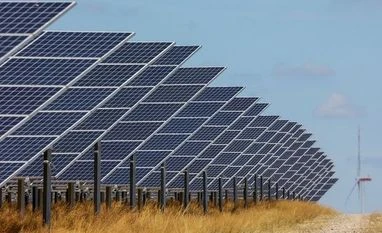Adani Enterprises Chairman Gautam Adani in January 2020 declared his group would invest $20 billion in renewable energy (RE) development over the next decade.
The company has set a target of achieving a capacity of 45 Gw of RE by 2030, the same year India is envisaging to have 500 Gw of non-fossil fuel capacity.
Among the established players (which have operational projects), Adani Green Energy (AGEL) not only holds the biggest renewable energy portfolio but aims to construct close to 10 per cent of India’s targeted RE capacity by 2030.
It has in its kitty some of the largest single-destination solar-power parks in Gujarat, Rajasthan, and Karnataka.
In comparison, all other leading players fall way behind.
Tata Power’s solar power capacity stands at 5.6 Gw and it is aiming to have 25 Gw by 2030. ReNew has a commissioned capacity of 7 Gw and 5.7 Gw is under construction. Reliance Industries is aiming to set up 100 Gw of renewable energy capacity but is yet to commission any project, also most of the capacity would be for captive use.
But what made AGEL the poster boy of India’s RE sector till recently is what could create a major hurdle for the company and the country’s RE goals.
Goal versus money
Following the Hindenburg report, AGEL has decided to review its capital expenditure (capex) plan of Rs 10,000 crore for 2023-24 (FY24). In a post-third quarter results call with its bond holders, AGEL’s management said this was a tentative target and was still under review, this paper reported recently.
This stands in contrast with the robust growth plans the company has on capacity addition.
According to the data shared by company officials during investor concalls, it has close to 15 Gw of capacity under construction.
According to Moody’s, AGEL’s growth plans will entail capital spending of around Rs 63,400 crore over the next five years.
For its under-construction projects, AGEL takes construction financing from banks, and, once the projects are operational, refinances that portfolio with international bond funding. But it is refinancing that is cause for concern now.
“AGEL will have $2.7 billion of refinancing due in fiscal year ending March 2025 (fiscal 2025), including $750 million and $500 million of AGEL RG-1 notes maturing in September 2024 and December 2024 respectively. This is the key driver for the negative outlook on the ratings,” Moody’s said in its credit opinion on AGEL last month.
The document was reviewed by Business Standard.
In a call with bondholders last month, AGEL said: “For taking out the construction facility, we will continue to issue 20-year bonds which will be fully amortised with no refinancing risk.”
The company did not respond an emailed questionnaire from this paper on its financing plans.
Risk-reward ratio
In the call with bondholders, the AGEL management revealed a peculiar problem being faced by the company. It said state utilities were delaying the last-mile transmission infrastructure and this is compelling the company to take the infirm power route. Infirm power is feeding the electricity generated from a project directly to the grid before the commissioning of the project.
This, however, also points to a larger problem, something that global investors in RE companies have always been worried of -- the health of the off taker. While AGEL does have an exposure to some of the RE-resource rich states, their electricity departments are also some of the biggest defaulters -- barring Gujarat.
This, coupled with the lag in support infrastructure, brings a high sense of uncertainty in its projects for its investors, especially global bond markets.
AGEL has a healthy EBITDA (earnings before interest, tax, depreciation and amortisation) margin compared to its peers, say market observers but there is limited headroom for taking more debt.
Moody’s in its rating downgrade of AGEL said: “The negative rating outlook factors in AGEL’s significant refinancing needs of around $2.7 billion in March 2025; its large capital spending program; and dependence on sponsor support, through subordinated debt or shareholder loans.”
In July 2021, AGEL had received the shareholders’ nod to increase its borrowing limit to Rs 25,000 crore.
BlackRock, one of the world’s largest investment companies, however, had voted against it, citing “(proposed authorisation) may result in debt level that exceeds market standards.”
Such warnings have now come back to haunt AGEL as it tries to recover from a stock rout and a hit to its borrowing capabilities in global markets.
Unlock 30+ premium stories daily hand-picked by our editors, across devices on browser and app.
Pick your 5 favourite companies, get a daily email with all news updates on them.
Full access to our intuitive epaper - clip, save, share articles from any device; newspaper archives from 2006.
Preferential invites to Business Standard events.
Curated newsletters on markets, personal finance, policy & politics, start-ups, technology, and more.
)